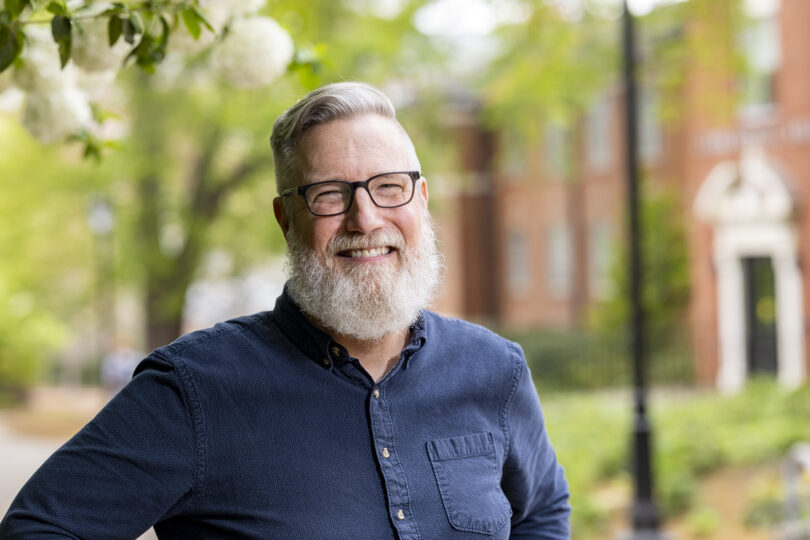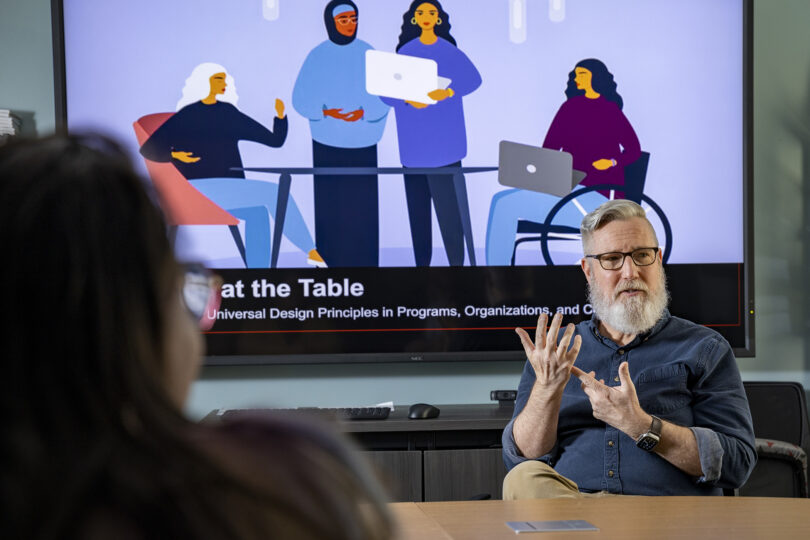Assistant director provides access, advocacy
Kevin Karneboge serves UGA’s Deaf and hard of hearing communities

For Kevin Karneboge, American Sign Language isn’t just about communication. It’s about access and advocacy.
“Deafness is a medical thing, but really it’s the missing out of information,” he said. “With a little foresight, it doesn’t have to be that way.”
As assistant director of deaf and hard of hearing services for the Disability Resource Center in the Division of Student Affairs, Karneboge coordinates and supervises a variety of programs and aids for those communities at the University of Georgia.
“I love being in education,” he said.
That has been a theme for Karneboge’s career, having been at UGA for 30 years. Prior to that, he worked at Clarkston High School in Atlanta, building his interpreting skills working with students.
Karneboge’s interest in ASL began in college. He took a class in it on a whim but connected with it quickly.
“I have to be truly invested in something and interested in something to do well, and I was that with sign language,” he said. “I love language. I love the way language evolves and the way that it happens naturally.”
After earning a degree in ASL interpreting, several fields were open to Karneboge. In the world of interpreting, there are legal interpreters, medical interpreters and several others, but educational interpreting appealed most to him.
“I like educational interpreting because it has variety,” he said. “I’ve been put in so many situations, and I truly enjoy it. I like the diversity.”
Karneboge started at UGA in 1994 as a full-time interpreter at the encouragement of a former co-worker who was then working at the university. When he left, Karneboge became the lead coordinator. He’s been assistant director for eight years.

The Deaf population at UGA ebbs and flows, but Karneboge said the average is around three students. He’s responsible for coordinating interpreters for those students’ classes, and they’re paired based on availability and knowledge of and interest in the subject matter. Karneboge still frequently interprets himself, often at university-wide events like Commencements.
Because the level of hearing ability varies among the Deaf and hard-of-hearing community, Karneboge’s team offers a variety of services in addition to interpreting, including assisted listening devices and real-time captioning in the classroom.
Those kinds of technological advances during the last 30 years have helped those Karneboge serves. For example, he points out that the ability to text offered a great deal of independence to deaf and hard-of-hearing people. Additionally, technologies like Zoom have allowed ASL to spread beyond its regional dialects and increased the ability for the Deaf community to communicate.
“It’s offered a lot of things to the Deaf community,” he said.
Karneboge hopes for even more improvement with those technologies. Right now, about 83% accuracy in automated captioning is considered good. That can increase significantly, even to 100%, when reviewed by a hearing person, giving true access to those who need it.
Karneboge tries to divide his day between interpreting, which is his most important duty, and other administrative work like scheduling and supervising his team.
While he said that interpreting is both his favorite and the hardest part of his job, another significant part of it is advocacy.
“We’re fighting the little battles here and there, making sure there is access,” he said.
Occasionally, that need for access extends beyond UGA’s campus. One of Karneboge’s favorite experiences was providing services for a student during a Study Away program in France.
Outside of work, Karneboge enjoys spending time with his family and spending time outdoors camping and hiking. He also loves traveling and playing soccer.
But regardless of where Karneboge is, he’s always willing to help.
Article by Krista Richmond

